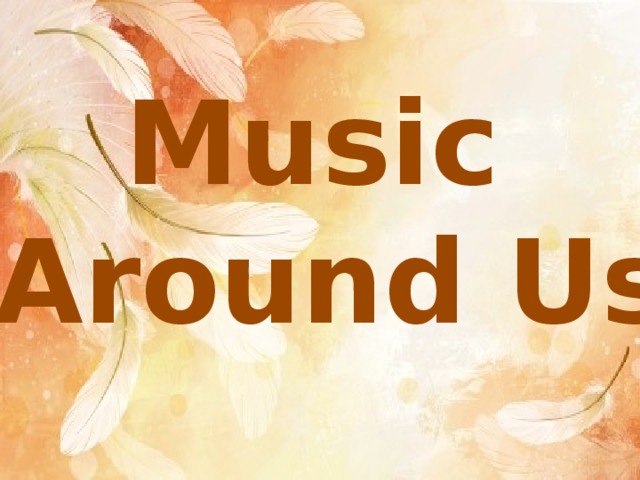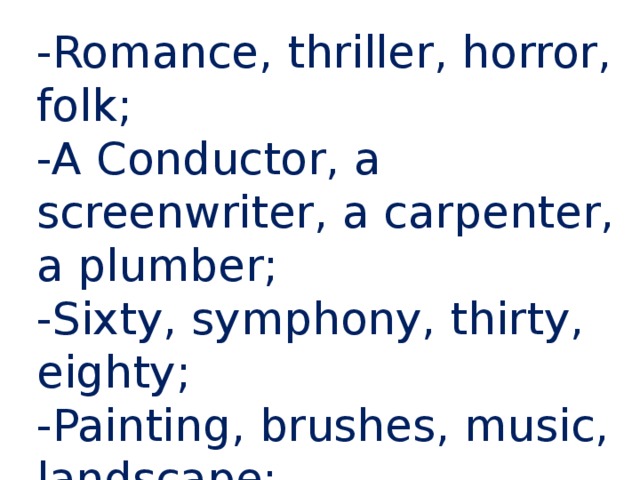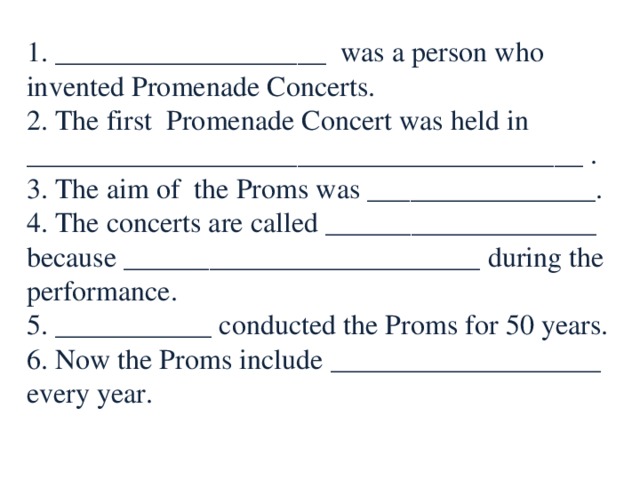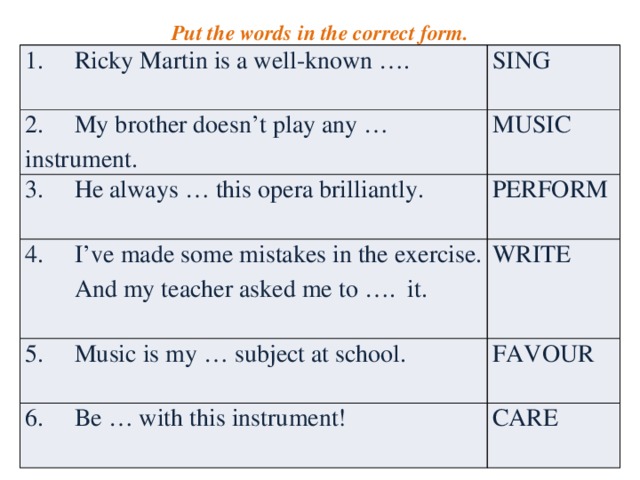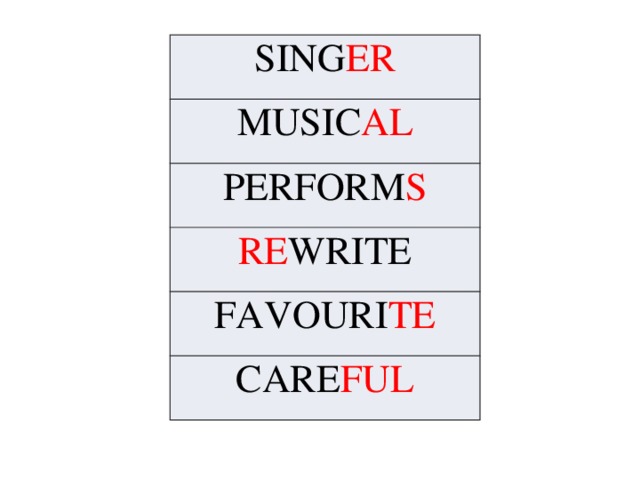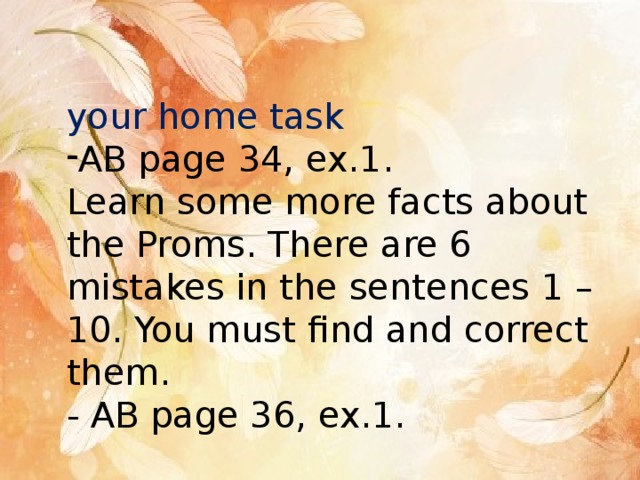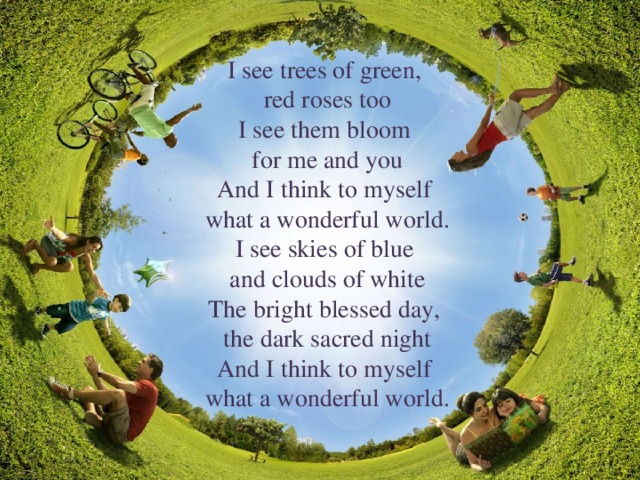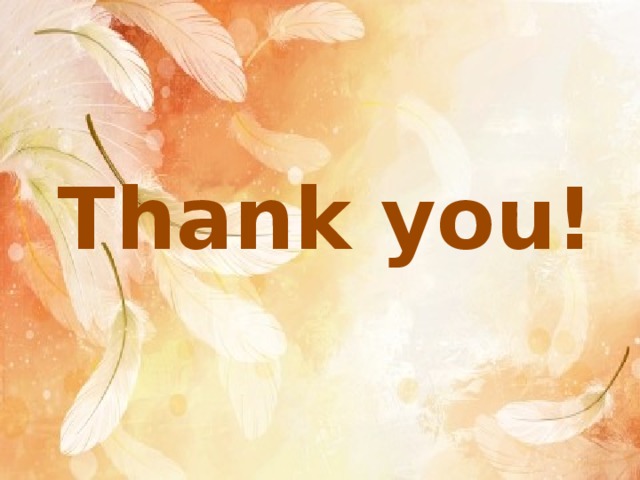Тема урока: Music Around Us
Цель: Актуализировать роль классической музыки в жизни современной молодежи повышать интерес к классической музыке.
Задачи:
Развивать навыки коммуникативной компетенции в монологической и диалогической речи, аудировании и чтении.
Активизировать употребление лексики по теме, расширять словарный запас.
Способствовать ознакомлению с иноязычной культурой и расширению кругозора учащихся.
Прививать любовь к музыке, знакомить с правилами поведения на концерте.
Ход урока
I. Организационный момент.
Good morning our guests. We are glad to see you.
Good morning dear pupils. Nice to see you.
Good morning. We are glad to see you.
How are you? I'm fine thanks.
Are you fine today? Thank you. I'm fine.
Who is absent today? Nobody is absent today.
What date is it today? Today is the twenty fifth of October.
What day is it today? Today is Thursday.
What is the weather like today? Today is cold and windy. The weather is bad.
II. Введение в тему, фонетическая разминка:
T: At the beginning of our lesson I’d like you to look at the blackboard. Here you can see some lines of words. In each line there is one different word. Your task is to find it.
Romance, thriller, horror, folk;
A Conductor, a screenwriter, a carpenter, a plumber;
Sixty, symphony, thirty, eighty;
Painting, brushes, music, landscape;
Telephone, radio, xylophone, computer;
T – P1: Tell us on what theme are all the different words.
P1: They are on the theme “Music”
T: Right you are. Today we are going to speak about music in our life.
III. Речевая разминка.
T: Let’s imagine that we are in a music shop and want to buy a disk with Mozart’s music. On your desks you have pieces of such dialogue. Put these sentences into the correct order to make up a dialogue. The dialogue is between a salesperson and a buyer. (You have 2 minutes)
| P1 – Good morning! Can I help you? |
| P2 – Good morning! Can you help me to find a disk with Mozart's music. I did't notice it on the shop- window. |
| P1 – I'm sorry, but we don't have it. I can offer you another music, which is also good. |
| P2 – What is it? |
| P1 – It is a relax music: here are the pieces of different composers. Listen to it please. |
| P2 – Oh, that's wonderful! It rouses my best feelings. I'll buy this disk. How much is it? |
| P1 – Three dollars, please. |
| P1 – Your charge, please. If you want to buy the disk of Mozart's pieces, we will bring it next Monday. |
| P2 – Thank you. I'll come. Good bye. |
IV. Проверка домашнего задания.
T: Now I want to know about you favourite sort of music.
What kind of music do you like to listen to? And why?
V. Основная часть.
T: But I think that classical music is very beautiful. Only classical music enriches our hearts and feelings.
T: Complete the word web (Classical music).
Where can we listen to classical music? (P1: We can listen to it everywhere. For example, we can hear it in the a forest, at a concert halls, on TV or over the radio, at a bus.)
When are the concerts held? (at concert halls, at opera houses, in London)
Who comes to the concerts? (tourists, Londoners, all people, young people, students)
Who takes part in the concerts? (famous orchestras and conductors, singers, dancers)
Classical music
1) Listening (B. page 185, ex.1)
T: There are a lot of musical places and events in Great Britain. Promenade Concerts or “Proms” are monthly events in Britain. Listen to the text about Promenade Concerts and be ready to fill in the gaps. Take the cards on your desks, write down your name and surname.
2) Writing. Complete the sentences.
1. ___________________ was a person who invented Promenade Concerts.
2. The first Promenade Concert was held in ________________________ .
3. The aim of the Proms was ____________________________________ .
4. The concerts are called ________________________________ because __________________________________ during the performance.
5. _______________________________ conducted the Proms for 50 years.
6. Now the Proms include ______________________________ every year.
VI. Физминутка.
T: I see that you are tired a little. Let’s have a rest and listen to some pieces from different songs. While you are listening try to guess the genres of music.
3) Speaking (B. page 48, ex. 4)
T: You have learned about musical festival, but do you know the rules of people’s behaviour at a concert of classical music?
T: Do you agree with the five things they ask you not to do during a concert?
P1: I think people who eat, cough or take photos during the concert disturb the others and don’t let them listen to the music, and the alarms make people around you annoyed.
P2: I find most annoying when people eat and drink during the performance because it shows their disrespect towards the musicians and the rest of the audience, etc.
4) Work in pairs. Dialogue “After a concert”
Т: Imagine we are all dressed up and going to the promenade concert. Your neighbour’s behaviour annoyed you and your friend. Act out a dialogue in which you complain to each other about their behaviour. (You have 5 minutes)
Pupil1: Did you enjoy the concert?
Pupil2: I’m afraid I didn’t.
Pupil1: Why?
Pupil2: I’m sorry to say but I didn’t hear well enough what was being played on the stage.
Pupil1: Did you?
Pupil2: One of my neighbors was constantly coughing, another was whispering to his girl-friend.
Pupil1: Oh dear! Couldn’t you help it?
Pupil2: I asked that guy not to whisper but he didn’t stop it.
5) Reading
T: Now let’s read the text about the history of sound recording. Then you’ll do some tasks on the text.
Чтение текста вслух по цепочке (P1, P2, P3 ….). Заполнение таблицы
The History of Sound Recording
An American called Thomas Alva Edison was the first man to record sound. In 1878 he invented a machine called a phonograph. The phonograph was a bit like a record player, but it used metal cylinders instead of discs (records) appeared ten years later.
Tape records first appeared in the 1930s, but they were large and expensive. Then, in 1963, the Philips Company developed the first cassette.
Cassettes are still very popular all over the world. But when you go into a music shop today, you don’t just see records and cassettes. There are CDs too, and DAT (digital audio tape) cassettes, and even video discs. The choice is amazing!
Complete the notes
Inventor of the phonograph Thomas Alva Edison
Year first records appeared ……
Year first cassettes appeared ……
Company who made first cassettes ……
Different products in music shops: 1Records
2
3
4
5
6) Put the words in the correct form. Check your knowledge in the word building.
| 1. Ricky Martin is a well-known …. | SING |
| 2. My brother doesn’t play any … instrument. | MUSIC |
| 3. He always … this opera brilliantly. | PERFORM |
| 4. I’ve made some mistakes in the exercise. And my teacher asked me to …. it. | WRITE |
| 5. Music is my … subject at school. | FAVOUR |
| 6. Be … with this instrument! | CARE |
VII. Домашнее задание.
Write down your home task. AB page 34, ex.1. Learn some more facts about the Proms. There are 6 mistakes in the sentences 1 – 10. You must find and correct them. AB page 36, ex.1.
VIII. Подведение итогов деятельности. Рефлексия.
You've worked hard today, it was real pleasure to listen to your dialogues and stories. We see that it is impossible to live without music and you can hardly find a person, who doesn't like or need music, who never sings or dances. Let’s sing the extract from one of the most famous songs “What a wonderful life”.
- Could you be so kind to sing our lovely song «What a Wonderful World» for us, please.
- Of course, with your help, with great pleasure.
I see trees of green, red roses too
I see them bloom for me and you
And I think to myself what a wonderful world.
I see skies of blue and clouds of white
The bright blessed day, the dark sacred night
And I think to myself what a wonderful world.
The colours of the rainbow so pretty in the sky
Are also on the faces of people going by
I see friends shaking hands saying how do you do
They`re really saying I love you.
I hear babies crying, I watch them grow
They`ll learn much more than I`ll never know
And I think to myself what a wonderful world
Yes I think to myself what a wonderful world.
Your marks for today lesson are …
T: Thank you for the lesson. Goodbye!
Приложение (разрезные карточки для учащихся)
| – Good morning! Can I help you? |
| – Good morning! Can you help me to find a disk with Mozart's music. I did't notice it on the shop- window. |
| – I'm sorry, but we don't have it. I can offer you another music, which is also good. |
| – What is it? |
| – It is a relax music: here are the pieces of different composers. Listen to it please. |
| – Oh, that's wonderful! It rouses my best feelings. I'll buy this disk. How much is it? |
| – Three dollars, please. |
| – That's it. |
| – Your charge, please. If you want to buy the disk of Mozart's pieces, we will bring it next Monday. |
| – Thank you. I'll come. Good bye. |
| – Good bye. |
| – Good morning! Can I help you? |
| – Good morning! Can you help me to find a disk with Mozart's music. I did't notice it on the shop- window. |
| – I'm sorry, but we don't have it. I can offer you another music, which is also good. |
| – What is it? |
| – It is a relax music: here are the pieces of different composers. Listen to it please. |
| – Oh, that's wonderful! It rouses my best feelings. I'll buy this disk. How much is it? |
| – Three dollars, please. |
| – That's it. |
| – Your charge, please. If you want to buy the disk of Mozart's pieces, we will bring it next Monday. |
| – Thank you. I'll come. Good bye. |
| – Good bye. |
Complete the sentences. ____________________________________
1. ___________________ was a person who invented Promenade Concerts.
2. The first Promenade Concert was held in ________________________ .
3. The aim of the Proms was ____________________________________ .
4. The concerts are called ________________________________ because __________________________________ during the performance.
5. _______________________________ conducted the Proms for 50 years.
6. Now the Proms include ______________________________ every year.
Complete the sentences. ____________________________________
1. ___________________ was a person who invented Promenade Concerts.
2. The first Promenade Concert was held in ________________________ .
3. The aim of the Proms was ____________________________________ .
4. The concerts are called ________________________________ because __________________________________ during the performance.
5. _______________________________ conducted the Proms for 50 years.
6. Now the Proms include ______________________________ every year.
Complete the sentences. ____________________________________
1. ___________________ was a person who invented Promenade Concerts.
2. The first Promenade Concert was held in ________________________ .
3. The aim of the Proms was ____________________________________ .
4. The concerts are called ________________________________ because __________________________________ during the performance.
5. _______________________________ conducted the Proms for 50 years.
6. Now the Proms include ______________________________ every year.
Complete the sentences. ____________________________________
1. ___________________ was a person who invented Promenade Concerts.
2. The first Promenade Concert was held in ________________________ .
3. The aim of the Proms was ____________________________________ .
4. The concerts are called ________________________________ because __________________________________ during the performance.
5. _______________________________ conducted the Proms for 50 years.
6. Now the Proms include ______________________________ every year.
| 1. Ricky Martin is a well-known …. | SING |
|
| 2. My brother doesn’t play any … instrument. | MUSIC |
|
| 3. He always … this opera brilliantly. | PERFORM |
|
| 4. I’ve made some mistakes in the exercise. And my teacher asked me to …. it. | WRITE |
|
| 5. Music is my … subject at school. | FAVOUR |
|
| 6. Be … with this instrument! | CARE |
|
Put the words in the correct form.
| 1. Ricky Martin is a well-known …. | SING |
|
| 2. My brother doesn’t play any … instrument. | MUSIC |
|
| 3. He always … this opera brilliantly. | PERFORM |
|
| 4. I’ve made some mistakes in the exercise. And my teacher asked me to …. it. | WRITE |
|
| 5. Music is my … subject at school. | FAVOUR |
|
| 6. Be … with this instrument! | CARE |
|
Put the words in the correct form.
| 1. Ricky Martin is a well-known …. | SING |
|
| 2. My brother doesn’t play any … instrument. | MUSIC |
|
| 3. He always … this opera brilliantly. | PERFORM |
|
| 4. I’ve made some mistakes in the exercise. And my teacher asked me to …. it. | WRITE |
|
| 5. Music is my … subject at school. | FAVOUR |
|
| 6. Be … with this instrument! | CARE |
|
Put the words in the correct form.
| 1. Ricky Martin is a well-known …. | SING |
|
| 2. My brother doesn’t play any … instrument. | MUSIC |
|
| 3. He always … this opera brilliantly. | PERFORM |
|
| 4. I’ve made some mistakes in the exercise. And my teacher asked me to …. it. | WRITE |
|
| 5. Music is my … subject at school. | FAVOUR |
|
| 6. Be … with this instrument! | CARE |
|
Put the words in the correct form.
Classical music Classical
music
The History of Sound Recording
An American called Thomas Alva Edison was the first man to record sound. In 1878 he invented a machine called a phonograph. The phonograph was a bit like a record player, but it used metal cylinders instead of discs (records) appeared ten years later.
Tape records first appeared in the 1930s, but they were large and expensive. Then, in 1963, the Philips Company developed the first cassette.
Cassettes are still very popular all over the world. But when you go into a music shop today, you don’t just see records and cassettes. There are CDs too, and DAT (digital audio tape) cassettes, and even video discs. The choice is amazing!
Complete the notes
| Inventor of the phonograph Year first records appeared Year first cassettes appeared Company who made first cassettes Different products in music shops: | Thomas Alva Edison ____________________________________________________ ____________________________________________________ ____________________________________________________ 1Records 2 _____________________________________ 3 _____________________________________ 4 _____________________________________ 5 _____________________________________
|
_________________________________________________________________________________________
The History of Sound Recording
An American called Thomas Alva Edison was the first man to record sound. In 1878 he invented a machine called a phonograph. The phonograph was a bit like a record player, but it used metal cylinders instead of discs (records) appeared ten years later.
Tape records first appeared in the 1930s, but they were large and expensive. Then, in 1963, the Philips Company developed the first cassette.
Cassettes are still very popular all over the world. But when you go into a music shop today, you don’t just see records and cassettes. There are CDs too, and DAT (digital audio tape) cassettes, and even video discs. The choice is amazing!
Complete the notes
| Inventor of the phonograph Year first records appeared Year first cassettes appeared Company who made first cassettes Different products in music shops: | Thomas Alva Edison ____________________________________________________ ____________________________________________________ ____________________________________________________ 1Records 2 _____________________________________ 3 _____________________________________ 4 _____________________________________ 5 _____________________________________
|
